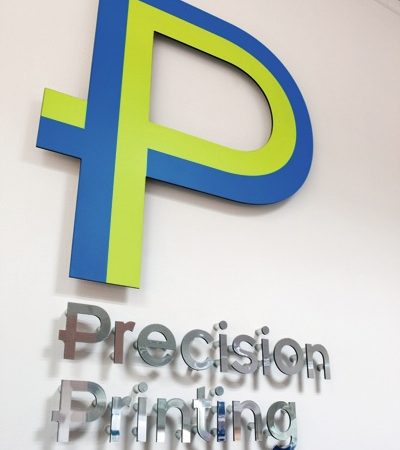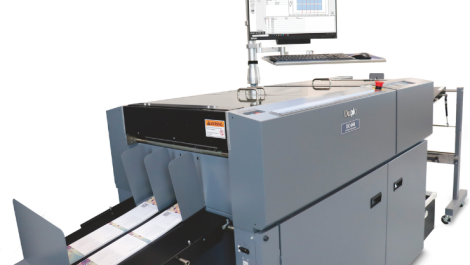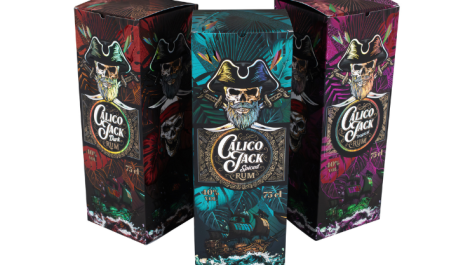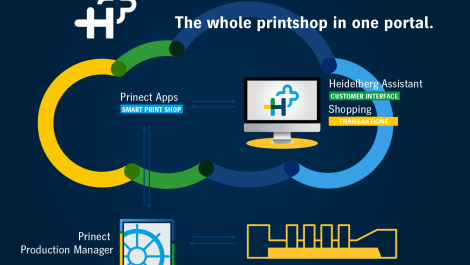The site of the UK’s first beta test on the B2 format HP Indigo 10000 press, Precision Printing has opened its doors to visitors to share the new opportunities on the horizon.
Aeureka moment has taken place in Barking, east London. Beta testing on the HP Indigo 10000 digital press has been continuing for some months, and as the company tried out various applications with the B2 format press, it came to a realisation: with canny imposition, the 750 x 530 mm sheet that the Indigo can print on can take five A4 pages to view, giving it a saving of 35% compared to its earlier HP Indigo 7000 series presses.
‘This sheet is larger than any B2 offset press on the market,’ said managing director Gary Peeling. ‘This allows great flexibility. We can impose greeting cards eight-up, and when you sell them at £3 each, that’s £24 per sheet. As we were looking at that we came across our eureka moment: five pages of A4 on a single sheet.
This type of advantage is extremely valuable.’ The company has been sufficiently pleased with its beta progress with the 10000 press to open its doors to fellow Indigo users from across Europe. It is not the only beta site in the UK – Pureprint also has the press – but it was the first to be announced, and in Mr Peeling, Precision has one of the UK print industry’s highest profile and most forward-thinking figureheads. Anyone that visited drupa last year will recall his image reproduced mega-size on a billboard across one entire side of the HP hall.
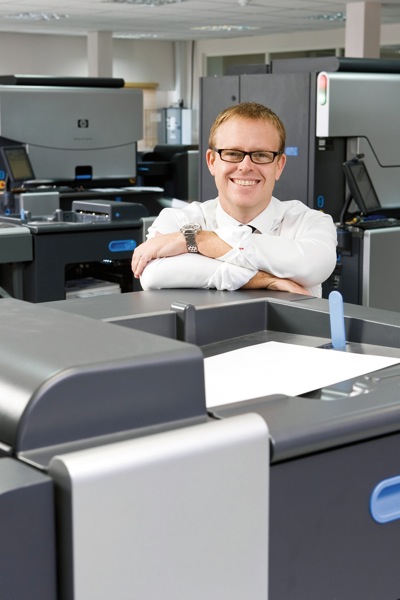 Managing director Gary Peeling
Managing director Gary Peeling
Precision Printing was gaining an unusual degree of attention even before the 10000 press beta wasannounced. It is a company that has reinvented itself. In 2006, it was a B2 litho-only operation, with 85 staff, an average of 45 orders coming in per day, and a flatlining turnover of £5.5 million. By 2012, with the introduction of digital printing, turnover was £14 million, and it was receiving up to 50,000 job orders per day, with an average order value of £2.30.
Radical change
Such a revolution calls for more than just some new printing technology. It calls for a radically different mindset and business and production infrastructure. Fifty thousand orders per day do not come in by telephone or email. Web to print has been the key driver, and Mr Peeling said that web to print orders have been doubling every year.
He is very clear in his mind about the nature of the industry today, and he is comfortable with it, commenting: ‘Digital printing is about the aggregation of small, low value orders.’ Web to print – or the various systems on offer in the marketplace at least – has not been all that Mr Peeling would have wished however.
Precision’s frustration led it to develop its own internal workflow software, now called OneFlow, which it is to offer as a commercial product to other printers (Jon Tolley’s Prime Group in Nottingham will become the first UK beta site at the end of June).
Mr Peeling explained: ‘Automated workflow is the key to success. We’ve been developing OneFlow for four or five years and have invested millions of euros in it. It started with these pesky web to print systems. I’ve had a few. They should be called web to nowhere. We were receiving lots of jobs, but we had no way of moving them through the factory.’
Incoming orders are put into the production schedule, taken through prepress automatically, and staff members are informed at every stage what their next task is. OneFlow can even advise how many staff will be needed, based on orders coming in. ‘Control and visibility are the number one aims of OneFlow,’ he said. ‘We are removing decision making from the production process; we want zero intervention.
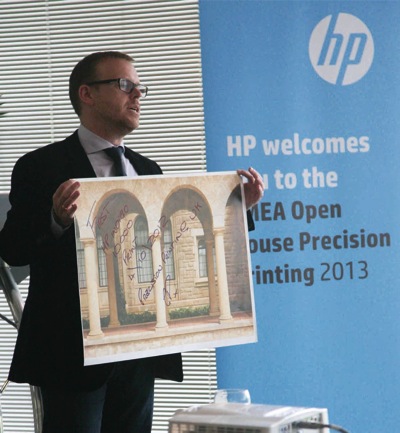
OneFlow understands the schedule; it’s dynamic and reconfigures all the time. We move production batches through so we can gather the finishing and make that efficient. Then we reconcile orders for integrated shipping. By automating we take out cost.
You can administer print on demand jobs for pence rather than pounds.’ OneFlow will be supported in Europe and the US, and will be charged according to two revenue models: companies can buy it as an onsite service with an annual subscription (around £25,000 for a single press site); alternatively, smaller firms can take it on a cloud-based software as a service model and pay by transaction.
For Precision, its quest for efficiency and valuable applications continues with the HP Indigo 10000 press, the extended format and sheet size helping to make a range of oversized products – calendars, photobooks, mailers, posters, gift wrap for example – viable. ‘What the 10000 does is allows us to produce these products on an industrial scale,’ said Mr Peeling. ‘It will also provide us with new formats and markets as well. The quality has been great since the very first print.’
